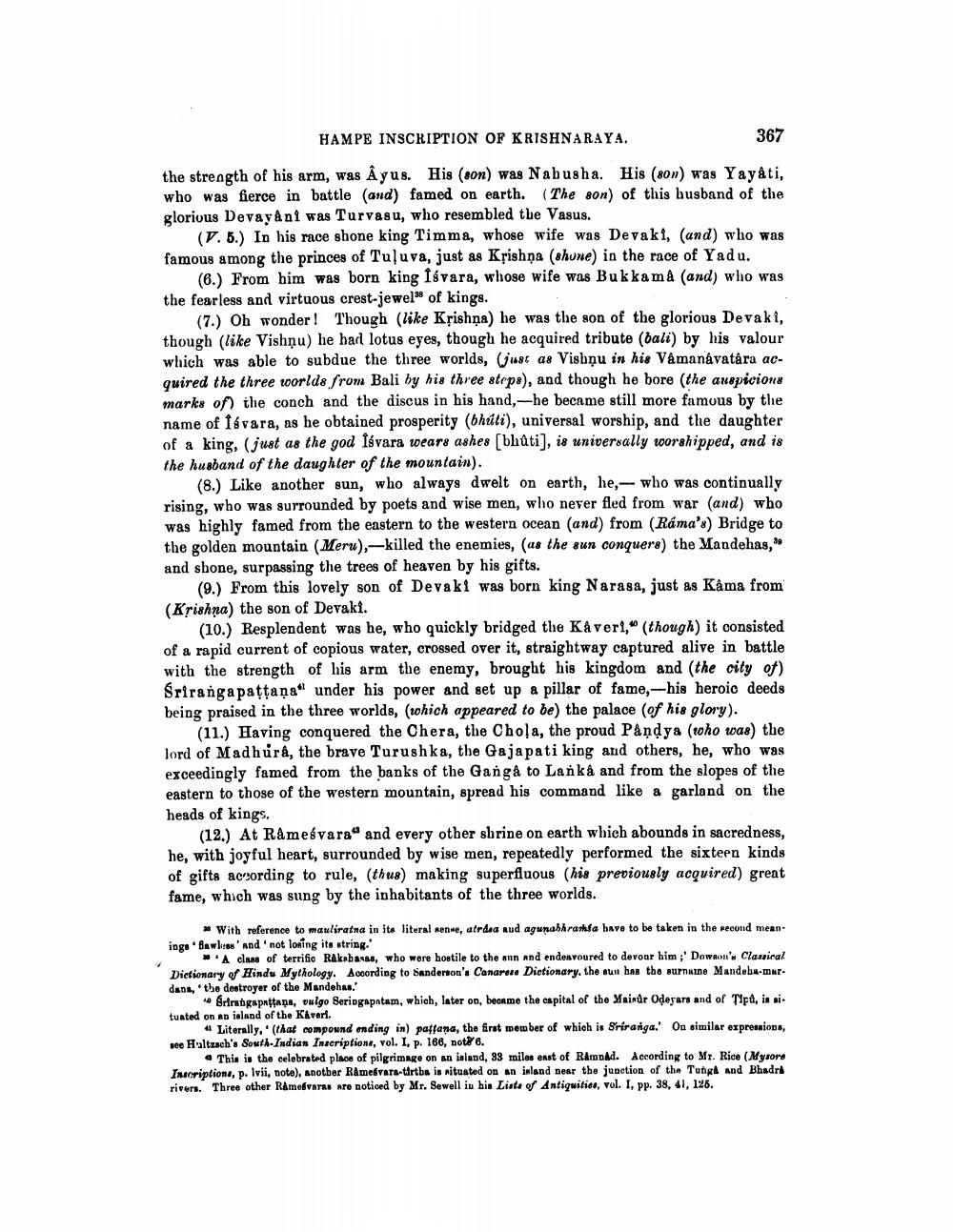________________
HAMPE INSCRIPTION OF KRISHNARAYA.
367
the strength of his arm, was Âyus. His son) was Nabusha. His (809) was Yayati, who was fierce in battle (and) famed on earth. The son of this husband of the glorious Devayant was Turvasu, who resembled the Vasus.
(V.5.) In his race shone king Timma, whose wife was Devaki, (and) who was famous among the princes of Tuluva, just as Krishna (shune) in the race of Yadu.
(6.) From him was born king Isvara, whose wife was Bukkama (and) who was the fearless and virtuous crest-jewel" of kings.
(7.) Oh wonder! Though (like Kộishna) he was the son of the glorious Devaki, though (like Vishņu) he had lotus eyes, though he acquired tribute (bali) by his valour which was able to subdue the three worlds, (just as Vishņu in his Vâmanávatára acquired the three worlds from Bali by his three steps), and though he bore (the auspicions marks of the conch and the discus in his hand, -he became still more famous by the name of Távara, as he obtained prosperity (bhriti), universal worship, and the daughter of a king, (just as the god Isvara wears ashes [bhůti], is universally worshipped, and is the husband of the daughter of the mountain).
(8.) Like another gun, who always dwelt on earth, he, who was continually rising, who was surrounded by poets and wise men, who never fled from war (and) who was highly famed from the eastern to the western ocean (and) from (Ráma's) Bridge to the golden mountain (Meru),-killed the enemies, (as the sun conquers) the Mandehas," and sbone, surpassing the trees of heaven by his gifts.
(9.) From this lovely son of Devaki was born king Narasa, just as Kåma from (Krishna) the son of Devaki.
(10.) Resplendent was he, who quickly bridged the Kaveri," (though) it consisted of a rapid current of copious water, crossed over it, straightway captured alive in battle with the strength of his arm the enemy, brought his kingdom and the city of) Srirangapattaņa" under his power and set up a pillar of fame,-his heroic deeds being praised in the three worlds, which appeared to be) the palace (of his glory).
(11.) Having conquered the Chera, the Chola, the proud Påndya (roho was) the lord of Madhura, the brave Turushka, the Gajapati king and others, he, who was exceedingly famed from the banks of the Ganga to Lanka and from the slopes of the eastern to those of the western mountain, spread his command like a garland on the heads of kings.
(12.) At Ramešvara" and every other shrine on earth which abounds in sacredness, he, with joyful heart, surrounded by wise men, repeatedly performed the sixteen kinds of gifts ac ording to rule, thus) making superfluous (his previously acquired) great fame, which was sung by the inhabitants of the three worlds.
* With reference to mauliratna in ito literal sense, atrda sud agunabhratha have to be taken in the recond meaninga. Bawlin' and not losing its string.
A class of terrific Raksbasas, who were hostile to the ann and endeavoured to devoar him ;' Dowson's Classical Dictionary of Hindu Mythology. According to Sanderton's Canarere Dictionary. the sun has the surnuine Mandebu-mardana, the destroyer of the Mandehas.
Srirangapattana, vulgo Seriogapntam, which, later on, became the capital of the Maisůr Odeyars and of Tip, is si. tuated on an island of the Kareri.
4 Literally..(that compound ending in) paffana, the first member of which is Sriranga.' On similar expressions, see Haltuach's South Indian Inscriptions, vol. I. p. 166, not#6.
• This is the celebrated place of pilgrimage on an island, 93 miles east of Ramad. According to Mr. Rice (Mysore Inscriptions, p. Ivii, note), another Råmefvara-tirtba is situated on an island near the junction of the Tunga and Bhadra rivers. Three other Råmesvaras are noticed by Mr. Sewell in his Lists of Antiquities, vol. I, pp. 38, 41, 126.




